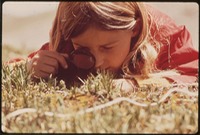Exploration
Exploration activities help students make discoveries related to the lesson's Big Idea(s). They promote inquiry and lead students toward asking the essential questions. Well designed exploration activities give students the opportunity to experience, think, investigate, probe, inquire, collect information, question, test, make inferences about relationships and problem solve. They promote a sort of "academic play", a chance to muck-about in learning.

Besides promoting inquiry, exploration activities provide additional advantages to the UDL based classroom.
- The playful quality engages students and reduces their fear of failure. When students have an opportunity to "play" with learning, the pressure to get the right answer and the threat of getting the wrong answer diminishes. Low-threat learning encourages all students to participate more and to take more academic risks.
- Exploration activities are easily leveled to meet individual student needs. By adjusting the amount of directions/support provided to the learner, educators can easily differentiate the degree of challenge.
- Exploration activities are student conducted. That means students choose the pace that works best for them.
- Because these activities are student conducted, students can repeat them over and over to achieve mastery.
Learning Roles during Exploration
Exploration activities require both the educator and the student to do things differently. There is a shift in who controls the learning. The student becomes the leader and the teacher plays the very important role of learning facilitator.
What the teacher does: |
What the student does: |
Acts as a facilitator |
Conducts investigations |
Observes and listens |
Forms predictions & hypotheses |
Asks probing questions |
Records observations and ideas |
Provides time for students to problem solve |
Shares thinking with others |
Encourages cooperative learning |
Web Resources
General Resources
NY Times - The learning Network
Wonderopolis – Contains the Wonder of the Day and you can also search for specific topics/questions.
Social Studies
How to teach with Google Earth
Using Google Maps in the Classroom
Interactive Social Studies Web Sites
Library of Congress
History on the Net
Children's Literature with Social Studies Themes
Hip Hughes History (You Tube Channel)
Journey of Mankind
History Detectives
Mapping History
People Movin (Migration Flows)
Gap Minder (Statistics/Facts/Trends)
Digital Docs in a Box (Documentary Kits)
Chatter
Science
Chem and Bio Resources from 37 years
National Science Digital Library
Science iPad Apps
Mathematics
National Library of Virtual Manipulatives
English Language Arts
Interactive Language Arts Web Sites